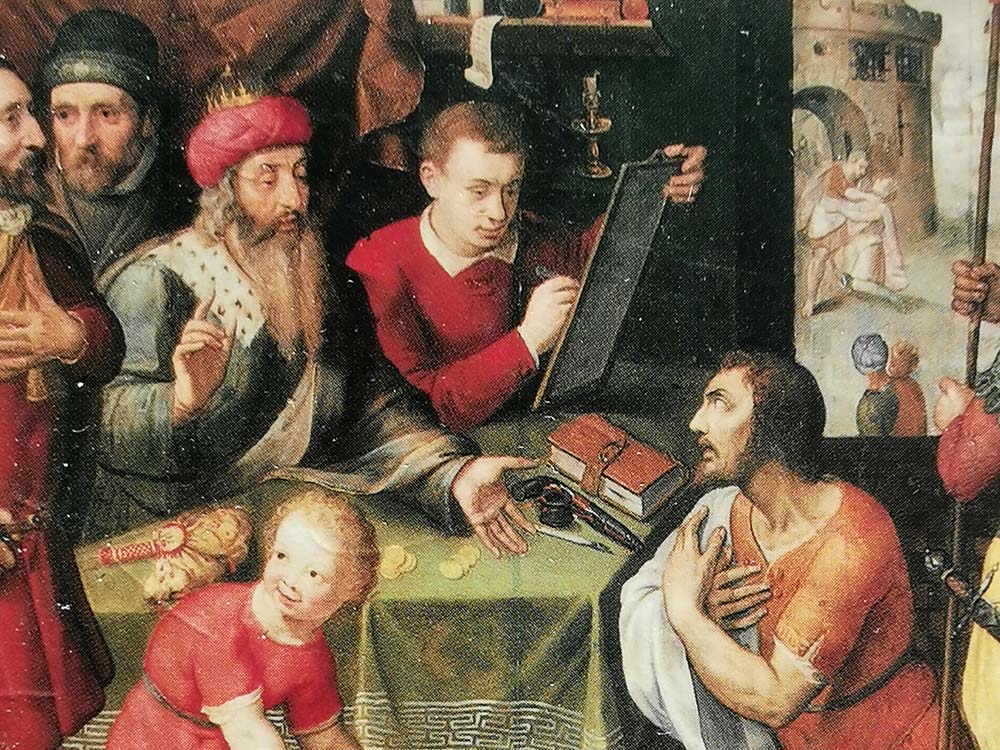
Years ago, one of our wise sisters told me, « Be careful about over-tending your wounds. Some people go through life pressing a bruise so that neither they nor (they hope) the world will ever forget it. »
It was quite an image. I could just see myself focusing on a purple mark on my arm, remembering exactly who had bumped up against me and my schemes and thrown my perfect plans out of whack.
Sister Margaret’s advice was a gentler version of Sirach’s opening observation: « Wrath and anger are hateful things, yet the sinner holds them tight. »
What motivates us to cherish wrath? Sirach doesn’t say, but he suggests that a remedy is to « remember our last days and set enmity aside. »
Where Sirach the sage gives us clear maxims, Jesus tells a story to confound us from multiple angles.
When Jesus talks about a king and two servants, the story sounds pretty straightforward. One person forgave, another didn’t, so the stingy guy loses in the end. Most third graders will get the message. But what if we dig deeper?
First of all, we have the king. He, of course, is omnipotent. He can buy and sell both people and things at will. He calls one of his slaves (that’s the literal translation) to « settle accounts. »
Now the slave is in big trouble; he owes the king something on the order of 6,000-10,000 days’ worth of wages — that’s about 20 years of work. Nobody but another king could come through with that amount.
When the slave begs, the king spares him and his family from being banished into obscurity.
What did the king accomplish? He demonstrated and acted with the full extent of his power and authority. The power to erase a debt is even greater than being able to collect on it. As we know from the reaction of the servants, the public saw what he did.
What did the slave perceive? We might say that he pleaded with the king and got what he asked for. Did he think he had pulled one over on the king? Did he feel ashamed that he had to stoop to begging? Did he feel like he had gotten let off? Did he think the king was stupid?
All those attitudes are possible at the same time. Even if the slave had conned the king, the entire situation made the vast difference in their power immensely, painfully, obvious. As slave, whether debtor or released, he would always see himself as beholden to the king — as would others.
In the next act, the tables turn; the absolved debtor has the upper hand over someone who owes him. And what does he do? Having learned nothing about real power, he exposes the puniness of his mind and heart by sending his fellow debtor to prison until the debt is paid — a highly unlikely outcome.
When others see how things progressed, the original debtor ends up in torture that he brought upon himself.
When we go beneath the surface of the story, we see that even after being relieved of his debt, the first slave chose to live in a world of oppression and domination. Although the king’s forgiveness had created an alternative to strict economic justice or tit-for-tat relationships, the slave rejected that option.
Given the opportunity to increase the bounteousness in the world, he instead supported a caste system that offered him petty superiority. By reinforcing a strictly transactional system and the power of domination, he ultimately became his own torturer.
As Sirach warned, he held tight to terrible things: there would always be someone over him and that would always torment him.
What can we take from this in September 2023? In the middle of the Season of Creation (Sept. 1-Oct. 4), we might read this parable from the vantage point of being creatures given an undeserved bounty of life and possibility. None of us has done anything to deserve the life we have, it is a pure gift of God — to us and to every other part of creation.
What does this suggest about the relationships we create with the rest of God’s creation?
Sirach talked about cherishing wrath. That seems to be the direct route to self-inflicted torment. How about the alternative of cherishing gratitude?
Instead of pressing the bruise, we might marvel out our bodies’ remarkable powers of regeneration and healing. Before we call in any debts, we might take account of what we have been given, beginning with life itself, and then all the unmerited advantages of our time and place in history.
God’s creation is lavish. We can be, too.